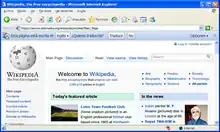Google Chrome Frame
Google Chrome Frame was a plug-in designed for Internet Explorer based on the open-source Chromium project, first announced on September 22, 2009.[1] It went stable in September 2010, on the first birthday of the project.[2] It was discontinued on February 25, 2014 and is no longer supported.[3]
 Internet Explorer 6 using Google Chrome Frame to render Wikipedia’s main page | |
| Developer(s) | Google Inc. |
|---|---|
| Initial release | September 22, 2009 |
| Final release | 32.0.1700.107 (February 1, 2014) [±] |
| Preview release | 32.0.1700.76 (January 13, 2014) [±] |
| Written in | C++ |
| Engine | WebKit (based on KHTML) |
| Operating system | Microsoft Windows |
| Type | Replacement layout engine |
| Website | www |
The plug-in worked with Internet Explorer 6, 7, 8 and 9.[3] It allowed suitably coded web pages to be displayed in Internet Explorer by Google Chrome's versions of the WebKit layout engine and V8 JavaScript engine. In a test by Computerworld, JavaScript code ran 10 times faster with the plug-in on Internet Explorer 8.[4]
Development of Google Chrome Frame was required in order for Google Wave (now Apache Wave), which requires HTML5, to function in Internet Explorer.
The first stable version supporting Non-Admin Chrome Frame was rolled out on August 30, 2011. The newer Chrome Frame installer ran at Admin level by default and fell back to Non-Admin mode if the user didn't have the necessary permissions on their machine.[5]
Deployment
Web developers can allow their websites to use the plug-in by using the following code on their web pages:
<meta http-equiv="X-UA-Compatible" content="chrome=1" />
This will cause the page to render in Chrome Frame for users who have it installed, without changing it for users who have not.
In February 2010, Google Chrome Frame was updated to also support deployment by HTTP headers, with a number of advantages, such as simplified sitewide support and support of the application/xhtml+xml MIME type even on Internet Explorer which normally does not support this MIME type for XHTML documents.[6] For a blanket rollout on an entire web site, an Apache server with mod_headers and mod_setenvif enabled can specify a header directive like this:
<IfModule mod_setenvif.c>
<IfModule mod_headers.c>
BrowserMatch chromeframe gcf
Header append X-UA-Compatible "chrome=1" env=gcf
</IfModule>
</IfModule>
Internet Explorer add-ons do not function on pages rendered using WebKit. There has been criticism concerning Chrome Frame from Mozilla[7][8] and Microsoft[9] as Chrome Frame "can disable IE features and muddle users' understanding of Web security matters". With Google Chrome Frame installed, users can add the gcf: prefix to URLs to render them with WebKit and V8 instead of Internet Explorer's built-in Trident engine after enabling this feature via a registry setting. An update also brought the possibility to navigate pages in IE utilising WebKit/V8 without the gcf: prefix:[10]
| Registry key | Value | Function |
|---|---|---|
HKCU\Software\Google\ChromeFrame | AllowUnsafeURLs=1 (DWORD) | By adding the gcf: prefix to the URL in address bar, the page will load rendered with WebKit/V8 |
IsDefaultRenderer=1 (DWORD) | Makes WebKit/V8 the default rendering technique |
Google Chrome Frame communicated with Google's servers: it reported installation to Google, downloaded updates to Chrome Frame and Google's Safe Browsing list, and at the user's discretion could send Google usage statistics and crash reports.[11]
References
- "Introducing Google Chrome Frame". Chromium Blog. Retrieved 2020-08-14.
- "Google Chrome Frame: Stable and Speedy". Chromium Blog. Retrieved 2020-08-14.
- "Chrome Frame - The Chromium Projects". www.chromium.org. Retrieved 2020-08-14.
- Amy Willis (2009-09-25). "IE8 browser runs faster with Google Chrome plug-in". The Daily Telegraph.
- "Non-Admin Chrome Frame Reaches Stable Channel". Chromium Blog. Retrieved 2020-08-14.
- "Google Chrome Frame Developer Updates". Chromium Blog. Retrieved 2020-08-14.
- Shankland, Stephen. "Mozilla VP: Chrome Frame is the wrong answer". CNET. Retrieved 2020-08-14.
- Keizer, Gregg (2009-09-29). "Mozilla slams Google's Chrome Frame as 'browser soup'". Computerworld. Retrieved 2020-08-14.
- Fried, Ina. "Microsoft bashes Google's Chrome-in-IE plan". CNET. Retrieved 2020-08-14.
- "Chrome Frame: Developer Guide - The Chromium Projects". Archived from the original on 2010-12-04. Retrieved 2020-08-14.
- "Google Chrome Frame Privacy Notice". Archived from the original on 2011-08-25.